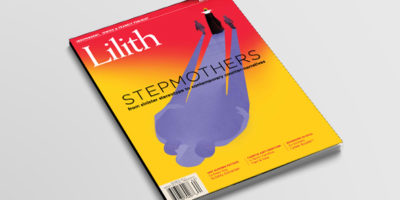Encouraging Empathy in This Season of Anger
Lilith is rounding the bend on its 40th anniversary, and in an accounting of the changes in women’s lives, in Jewish life and in our understanding of gender and power and inclusivity, there are plenty of landmarks to celebrate.
Gender justice? It’s no longer a fringe concern. Women rabbis? They’ve been on the bima for 40 years now. Rape or sexual assault a history you’d never reveal? A secret no more; even women legislators in the U.S. and Canada and Israel’s female Knesset members are going public about the assaults and sexual harassment they’ve experienced. Menstruation a taboo subject for “mixed company”? Better not be; New York City just authorized free menstrual products to be distributed in schools, shelters and jails. And the cover story of this issue brings another example of how revealing what goes on in real women’s real lives — stepmothers, in this case — pushes the myths off center stage.
Women know about how to effectuate social change. Speak out. Tell your truths, even the hard ones. Enlist allies. Sit in. Sing. And disrupt the status quo so that tikkun olam — the repair of the world — can happen.
Not all disruption is positive, though, and not all movement from the fringes to the front lines of public awareness improves things. At the same time that you can list inarguable milestones that make the exceptional seem the new normal (#FirstWomanPresidentialNomineeofMajorPoliticalParty), less desirable ideas and actions that were once far out on the periphery have also moved in from the margins to the center, and they are much more frightening than a wicked stepmother. The viciousness of public discourse and social-media hate speech around gender, race, and country of origin testify that boundaries have been breached. Ugly ideas people might have whispered or muttered to themselves are now being shouted out loud.
I write this column in what feels like the Summer of Discontent, as we navigate through an excrudescence of prejudice. Hatred and fear of the other are crowding out positive movements for social change.
This fraught season, you’ve seen the damage when things that were once considered unworthy of serious attention are now driving political ideologies and — worse — irrational acts. You don’t need me to list the examples. The hatred and misreading of the world that spurred a man to kill 49 people in an LGBT bar. The ease with which concealed weapons can be purchased for “self-protection.” The aggressively racist and xenophobic rants filling social media feeds and the airwaves these long months of the U.S. election season.
Susceptible to optimism, I was willing to believe that giving expression to almost all opinions would lead to improved understanding. That was before Orlando. Before anti-immigrant slogans. Before the shadowy alt-right unleashed their “echo” meme on the internet, with triple parentheses around the names of Jews, in order to target them. Target us. And before I saw the trailer for the film “Denial,” Hollywood’s version of the fight Deborah Lipstadt waged against Holocaust denier David Irving. The images and sounds onscreen are in a way more chilling than Lipstadt’s book on which the film is based; hearing aloud Irving’s claim that the Holocaust was a hoax makes the murder of millions of European Jews more horribly vivid.
When, several months ago, Alice Sparberg Alexiou proposed an article about a Jewish woman (her mother) who faced unambiguous anti-Semitism on a campus in 1941 and managed to find her equilibrium afterward, the narrative sounded compelling. It also felt quaint — a vignette about prejudice in a bygone era. But as our political moment becomes rapidly more poisonous, this story (on page 16) feels ripped-from-the-headlines pertinent, especially because its setting is the state whose reputation for bias grew with its 2016 bathroom laws.
In a time — ours — so filled with venom, it feels essential to reinforce the core feminist belief that hearing one another’s stories matters. So that empathy can crowd out misunderstanding, anger, and the denial of our common humanity, this issue of Lilith brings you a set of reports from the Land of Daughters. In addition to Alice’s account of her mother’s pain––and pleasure — at Chapel Hill 70 years ago, you’ll encounter two other daughters who, diversely, come to empathize with their mothers’ secrets and manage to learn from their conflicts.



